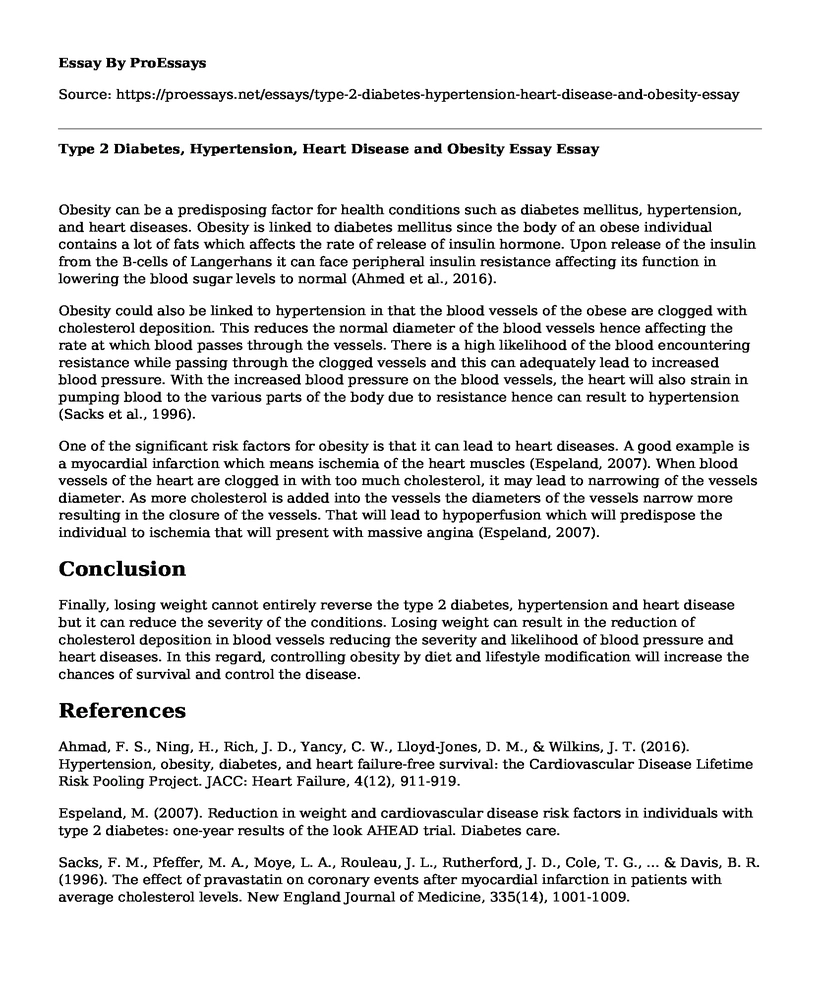Obesity can be a predisposing factor for health conditions such as diabetes mellitus, hypertension, and heart diseases. Obesity is linked to diabetes mellitus since the body of an obese individual contains a lot of fats which affects the rate of release of insulin hormone. Upon release of the insulin from the B-cells of Langerhans it can face peripheral insulin resistance affecting its function in lowering the blood sugar levels to normal (Ahmed et al., 2016).
Obesity could also be linked to hypertension in that the blood vessels of the obese are clogged with cholesterol deposition. This reduces the normal diameter of the blood vessels hence affecting the rate at which blood passes through the vessels. There is a high likelihood of the blood encountering resistance while passing through the clogged vessels and this can adequately lead to increased blood pressure. With the increased blood pressure on the blood vessels, the heart will also strain in pumping blood to the various parts of the body due to resistance hence can result to hypertension (Sacks et al., 1996).
One of the significant risk factors for obesity is that it can lead to heart diseases. A good example is a myocardial infarction which means ischemia of the heart muscles (Espeland, 2007). When blood vessels of the heart are clogged in with too much cholesterol, it may lead to narrowing of the vessels diameter. As more cholesterol is added into the vessels the diameters of the vessels narrow more resulting in the closure of the vessels. That will lead to hypoperfusion which will predispose the individual to ischemia that will present with massive angina (Espeland, 2007).
Conclusion
Finally, losing weight cannot entirely reverse the type 2 diabetes, hypertension and heart disease but it can reduce the severity of the conditions. Losing weight can result in the reduction of cholesterol deposition in blood vessels reducing the severity and likelihood of blood pressure and heart diseases. In this regard, controlling obesity by diet and lifestyle modification will increase the chances of survival and control the disease.
References
Ahmad, F. S., Ning, H., Rich, J. D., Yancy, C. W., Lloyd-Jones, D. M., & Wilkins, J. T. (2016). Hypertension, obesity, diabetes, and heart failure-free survival: the Cardiovascular Disease Lifetime Risk Pooling Project. JACC: Heart Failure, 4(12), 911-919.
Espeland, M. (2007). Reduction in weight and cardiovascular disease risk factors in individuals with type 2 diabetes: one-year results of the look AHEAD trial. Diabetes care.
Sacks, F. M., Pfeffer, M. A., Moye, L. A., Rouleau, J. L., Rutherford, J. D., Cole, T. G., ... & Davis, B. R. (1996). The effect of pravastatin on coronary events after myocardial infarction in patients with average cholesterol levels. New England Journal of Medicine, 335(14), 1001-1009.
Cite this page
Type 2 Diabetes, Hypertension, Heart Disease and Obesity Essay. (2022, Sep 22). Retrieved from https://proessays.net/essays/type-2-diabetes-hypertension-heart-disease-and-obesity-essay
If you are the original author of this essay and no longer wish to have it published on the ProEssays website, please click below to request its removal:
- An Awkward Conversation About HPV That Can Save You From Cancer
- Benefits of Organ Donation Essay
- The Case of the Article "Trends in Opioid Analgesic Abuse and Mortality in the United States"
- Community Action Service Awareness: How Sports Affect Student's Life Essay
- Essay on Negative Culture Plagues Medical-Surgical Units: Impact on Nurses
- Essay Example on Natural & Human-Made Disasters: Causes & Effects
- Essay on Coronavirus Crisis: US Economy Braces for 47 Million Job Losses







